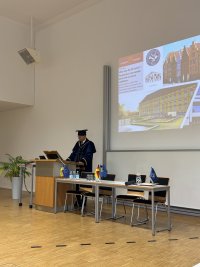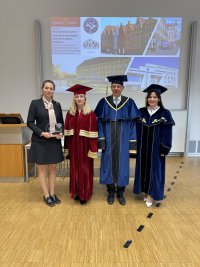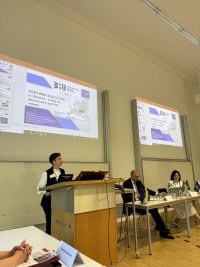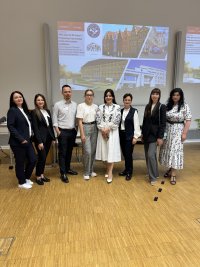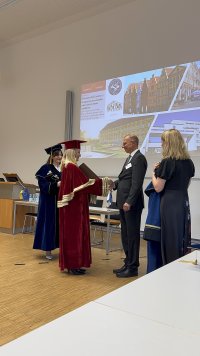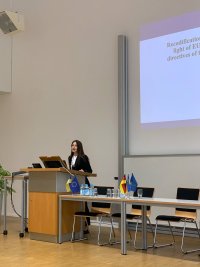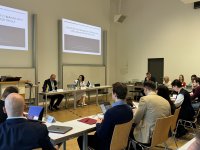Scientific and practical conference ‘Why does the EU matter? Perspectives from member states and accession candidates’
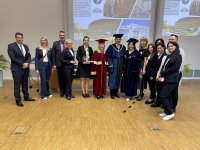 On 16 May 2025, Osnabrück University (Osnabrück, Federal Republic of Germany) hosted an international scientific and practical conference entitled ‘Why does the EU matter? Perspectives from member states and accession candidates’.The event served as a platform for professional discussion between leading scholars from Ukraine and Germany on the current challenges and prospects of European integration.
On 16 May 2025, Osnabrück University (Osnabrück, Federal Republic of Germany) hosted an international scientific and practical conference entitled ‘Why does the EU matter? Perspectives from member states and accession candidates’.The event served as a platform for professional discussion between leading scholars from Ukraine and Germany on the current challenges and prospects of European integration.
The conference consisted of two main parts: the first was a research workshop, during which participants presented their own research, discussed current trends in the transformation of legal systems, and sought effective mechanisms for adapting Ukrainian legislation to European Union standards. The session was moderated by the Vice-Rector for Academic Affairs and Research of West Ukrainian National University, Doctor of Law, Professor Uliana Koruts and Professor of Civil Law, European Private and Business Law, Comparative Law and History of European Law at Osnabrück University Hans Schulte-Nölke. In her welcoming speech, Professor Koruts emphasised the importance of scientific cooperation in the context of Ukraine's European integration course, highlighting the role of joint initiatives in ensuring stability and legal security in the region.
During the workshop, reports were presented by representatives of WUNU: Associate Professor of the Department of International and European Law Olha Zastavna, "Post-war elections in Ukraine: a test for democracy and EU values‘; Oksana Shevchuk, Associate Professor of the Department of Administrative Law and Judicial Proceedings, ’Optimisation of administrative-procedural safeguards for protecting rights in public legal relations as a determinant of Ukraine's European integration process‘; and Mykhailo Samuliak, lecturer at the Department of International and European Law, lawyer, managing partner of the law firm ’Samuliak and Partners‘, ’The self-governance of the bar as a guarantee of democratic justice: European standards and Ukrainian realities'. The scholars presented the results of their research in the field of comparative and European law.
The second part of the event was a formal public conference, during which Hans Schulte-Nölke, professor at Osnabrück University, was awarded the title of Doctor Honoris Causa of West Ukrainian National University.
The formal conference and award ceremony were opened by the Rector of the West Ukrainian National University, Doctor of Economics, Professor Oksana Desyatnyuk. In her speech, she emphasised that for Ukraine, European integration is the embodiment of the desire for peace, democracy, respect for human rights and the rule of law. The rector focused on Ukraine's strong potential as a strategic partner of the European Union, highlighting the active integration of Ukrainian universities into the European scientific and educational space.
The Rector of Osnabrück University, Professor Susanne Menzel-Riedl, addressed the audience with a welcoming speech in whom she highlighted the long-standing cooperation between the universities, which includes the organisation of joint scientific schools, conferences, seminars, as well as academic mobility for students and lecturers. The Director of the Institute of Law, Professor Mary Rose McGuire, also delivered a welcoming speech, emphasising the importance of internationalisation in legal education and openness to further joint initiatives.
Within the framework of the conference, presentations were made by Hanna Poperechna, Associate Professor of the Department of International and European Law at WUNU, on the topic ‘Recodification of Ukrainian contract law in the light of EU integration: Implementation of directives on the sale of goods and supply of digital content’ and member of the Supervisory Board of West Ukrainian National University, Professor of Civil Law at the Jagiellonian University, Professor of European Private Law, Comparative Law and Polish Private Law at Osnabrück University, Doctor Honoris Causa Fryderyk Zoll, with a report on ‘How the EU safeguards democracy, freedom and rule of law: The example of Poland and perspectives for Ukraine’.
The final and crowning moment of the conference was the awarding of an honorary doctorate from West Ukrainian National University to Professor Hans Schulte-Nölke of Osnabrück University in recognition of his significant contribution to the development of legal science, international academic cooperation and support for Ukraine's European integration.
Rector Oksana Desyatnyuk solemnly presented the professor with the diploma and robe of Honorary Doctor. In his inaugural speech, Professor Schulte-Nölke said: "It is a great honour and pleasure for me to become part of the distinguished scientific community of the West Ukrainian National University. This moment is important not only for me personally, but also symbolises the strong ties between our countries and universities. I have had the pleasure of working with Ukraine for over ten years, and during this time I have seen how your country is steadily moving forward, step by step, strengthening its position as a democratic, European state. The international community highly appreciates your efforts, courage and resilience in the struggle for independence and the rule of law. I am convinced that new joint educational and scientific projects await us, which will strengthen the partnership between our institutions and open new horizons for students and researchers from both countries. Thank you very much for this great honour and opportunity to move together towards new heights of knowledge and development!
The international scientific and practical conference ‘Why Does EU Matter? Perspective from member states and accession candidates’ became an important platform for professional exchange of views between Ukrainian and German scientists on the challenges and prospects of European integration of Ukraine. Discussions on topical issues of adapting national law to European Union standards contributed to a deeper understanding of legal transformations and strengthened academic partnerships between the two countries.

